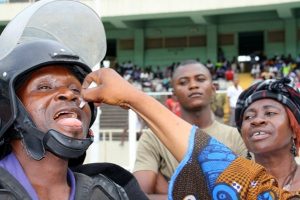Kinshasa battles re-emergence of polio
Everyone in the capital city is vaccinated in response to a large polio outbreak in the Democratic Republic of the Congo. This year, 10 of the 26 cases of wild polio virus in the country have been registered in Kinshasa.
By Cornelia Walther

UNICEF/C. Walther
KINSHASA, Democratic Republic of the Congo – The national football team was vaccinated against polio last week as part of a five-day vaccination drive to help stop polio in Kinshasa. The campaign, organized by the government with the support of polio eradication partners, aimed to reach more than eight million people.
This year, 10 of the 26 cases of wild polio virus in the country have been registered in the capital (as of 29 March). The disease usually affects mostly children, but the latest outbreak of polio in DR Congo – which began last year – is also now increasingly found in adults, among whom it takes its most severe form.
As part of the campaign, the entire national football team was vaccinated by a mobile vaccination team in Kinshasa’s stadium. A total of more than 5,000 mobile vaccination teams visited schools, markets, health centres, offices and homes.
UNICEF National Ambassador and captain of the DR Congo’s football team, Tresor Lualua, supported the campaign. “Children are our future,” he said. “That’s why it would be inexcusable to not ensure that they are in good health.”
Despite logistical challenges, the campaign was a success. So much so that by the last day, showing the ink-stained small finger of your left hand – which signified you’d been vaccinated – became a form of greeting.
“Whenever we asked someone on the street if he or she was vaccinated, they showed us their marked finger,” said the chief doctor of the Kinshasa Health Zone, Barumbu Gentil Mulumba. “It’s like a secret code.” More













